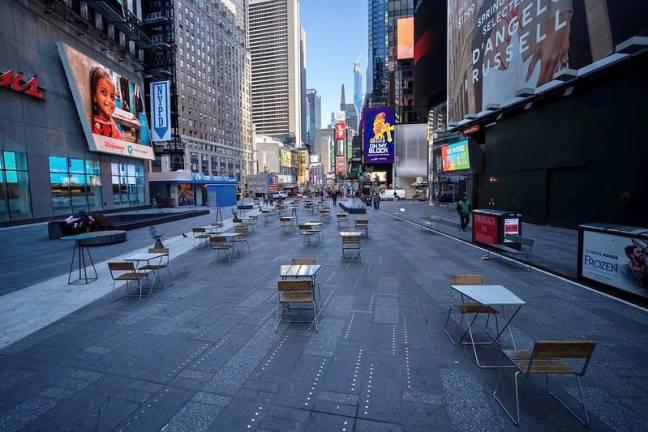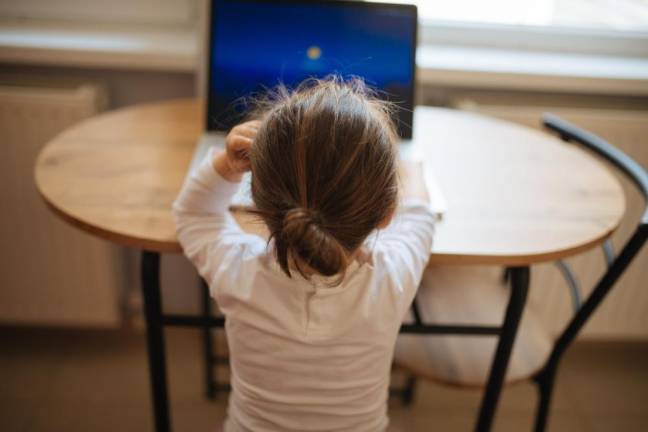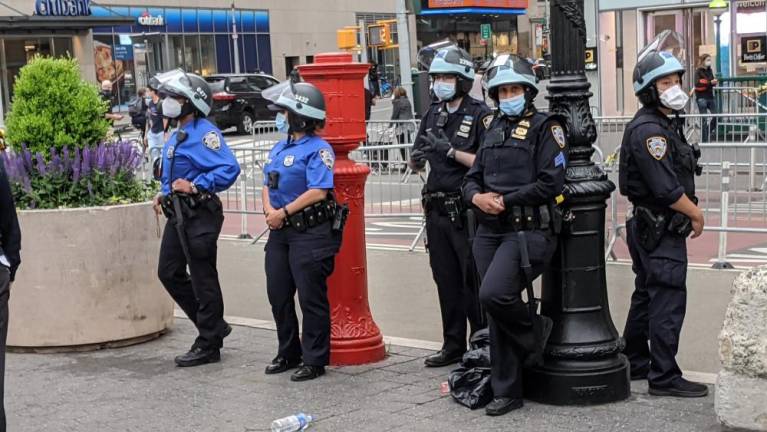Broadway’s Next Season - Oren Jacoby
“Alas, poor country,
Almost afraid to know itself. It cannot
Be called our mother, but our grave ...”
William Shakespeare wrote this in the wake of the plague that raged through the British Isles in 1603. His theater, The Globe, was shuttered for over a year, as 33,000 Londoners perished from the disease. That’s almost the same number of people that have died from this year’s pandemic in New York City.
But many in the Broadway community are confident that live theater will return. And, once again it will be a vital source of the energy, excitement and money driving New York’s cultural life and economy, as it has since the first theaters were built around Times Square in the early 20th century. Broadway’s last full season was its most well-attended and most profitable ever. Attendance rose 9.5 percent as almost 15 million people attended a Broadway show. Ticket revenues nearly reached $2 billion. Many billions more flowed into the city’s economy from those attending Broadway shows.
John Lithgow, a two-time Tony winner, remembers New York’s last big slump in the 1970s. “Half of the theaters on Broadway were dark. And I saw Broadway come roaring back. So I’m an optimist about Broadway. It’s like grass growing between the cracks in a concrete sidewalk. It is alive. It never dies. It grows and it blooms ... and it’ll bloom again.”
In 1606, a “second wave” of deaths forced The Globe and other London theaters to close again. During the two outbreaks, while performances of his plays were forbidden, Shakespeare spent the time writing. The results include Othello, King Lear, Macbeth, and Anthony and Cleopatra.
In 2020, with ample material for a drama of Shakespearean scale in the papers everyday, we can only imagine what is being written and what impact that play will have. And we can only hope it makes it to Broadway in the not-too-distant future.
Oren Jacoby is an Oscar-nominated filmmaker. His documentaries include “On Broadway” and the short “Give My Regards to Broadway” for The New Yorker.
Universal and Affordable Access to Broadband Internet Service - Julie Sandorf
COVID-19 has laid bare the social and economic inequities of our city, but none more so than for the 2.2 million New Yorkers (29% of the city’s population) without broadband internet connection at home.
Education, health care, work, job search, and almost all communications have gone online, but for those without access, it is impossible to attend school, seek employment, conduct a telemedicine session, register to vote or access basic services.
The digital divide, which public libraries helped to valiantly bridge, is also a geographic divide. In the South Bronx, 36% of households are without broadband, and across the city, 21% of all youth have no broadband access at home.
Broadband access is not a luxury- it is an absolute necessity, and should be accessible and affordable to low income households like all other utilities.
Julie Sandorf is president of the Charles H. Revson Foundation.
Restore the Anti-Crime Unit - Ray Kelly
One of the things that hurt the department was the elimination of the anti-crime unit. These are the plain clothes officers that hunt the hunters. That’s been eliminated and I think that is one of the prime reasons we’ve seen such an increase in shootings and murders. When that message went out, both internally and externally (to the criminal community), it was a sign of surrender.
Restoring that unit would make a big difference. We need to restore the police class that de Blasio canceled. We need cops on the streets. The restoration of overtime is a smart thing to do.
Ray Kelly is a former NYPD Commissioner.
Report for New York Project - Sarah Bartlett
As New Yorkers navigate the worst economic recession in decades and a critical election cycle that will yield a new mayor and an almost entirely new City Council, they will need accurate and timely information to make good decisions. Unfortunately, that need coincides with the collapse of the business model that has historically supported local news.
Overcoming this information deficit will require bold action. Among the ideas that should be considered:
· Replicate the model of Chicago’s City Bureau, which trains hundreds of civic-minded residents to become “documenters”, monitoring public meetings. To create this army of documenters, tap our city’s high schools, colleges, and graduate schools, which are teeming with young people eager to commit the act of journalism.
· Persuade real estate companies to convert some of their closed storefronts into neighborhood news hubs manned by these documenters, providing local residents with a place to drop in and pass along tips and ideas for coverage.
· Encourage local news organizations that are still standing to cooperate rather than compete. They should coordinate their coverage rather than expend precious resources duplicating each other’s work. And since further media consolidation is inevitable, they need to imagine creative new combinations.
Sarah Bartlett is Dean of the Craig Newmark Graduate School of Journalism at CUNY
Landlords and Small Business Owners Working Together - Liana Pai
LIANA is a business located on the UWS, started 38 years ago by two sisters. They have lived through many challenges but none more than COVID-19. Commercial landlords and small business owners have faced monumental financial losses, and it’s crucial for both parties to work together to develop solutions to stimulate the economy – and to save our streets from becoming wastelands of boarded-up windows.
Just as we needed government leadership to combat the virus, NYC can only recover when federal, state and city leadership step forward to create incentives for landlords to keep their tenants and engage “in-good-faith” negotiations on rent reductions, to establish security deposits for areas on past rent and introduce unemployment subsidies to cover half of the salary of small business owner’s employees, and to release federal funds to re-stimulate the economy.
We can’t continue to allow commercial landlords to use vacancy tax breaks as a means to balance their books. This gives them leverage to determine the survival of small businesses and their owners, and creates leverage over the future and the health of our city. These simple stimulus incentives will help our city survive and come back even stronger.
Liana Pai is the owner of LIANA on the Upper West Side.


